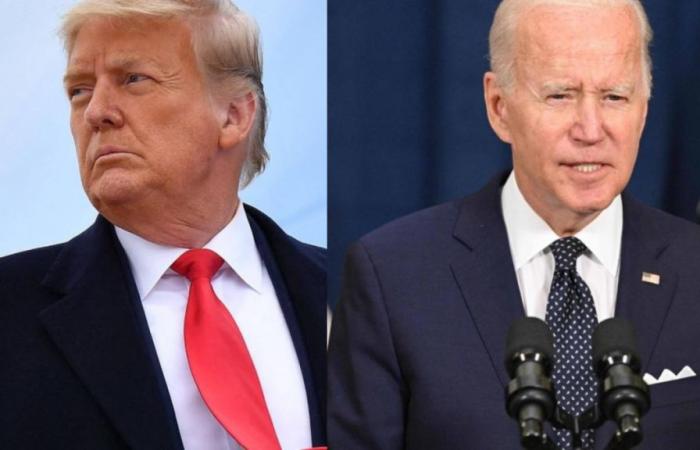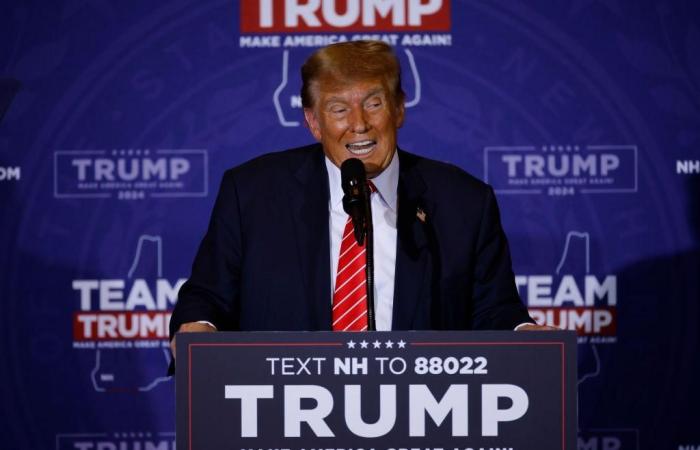This Thursday, Joe Biden and Donald Trump, the two candidates for the presidency of the United States, will face each other in a first television debate considered historic both for its form and for its content and context.
According to the criteria of
And, although there are still almost five months until the presidential elections, the head-to-head that two old rivals will meet in Atlanta, scheduled to start at 8 pm Colombian time, could define the name of the next occupant of the White House .
TIME explains why in 3 keys.
1. Donald Trump versus Joe Biden, a debate without precedent
In normal times, Debates ahead of the presidential elections in the United States usually take place between August and November of the election year. This is because it is usually the period of the campaign in which the parties complete their primary election process and confirm their candidate during the national conventions in view of the date indicated to go to the polls, in this case next December 5. November.
Generally, there are three debates – and one additional vice-presidential debate – that are agreed between the winning candidates, the Democratic and Republican National Committee and the Commission for Presidential Debates (CPD) with whom the rules of the debate are set. game.
The format, since these types of televised exchanges began in 1960, has been more or less the same: two “classic” debates with an audience included, usually at a university and moderated by journalists from the main television channels who choose the questions.
Joe Biden.
Photo:AFP | Jim Watson
The third and final one used to be a sort of “town hall meeting” in which candidates answer questions from audience members.
But, in 2024 we are not in normal times. A little over a month ago, President Joe Biden broke protocol by challenging Donald Trump to two televised debates, not three, before the election. This, despite the fact that neither of them has yet been nominated by his party and, therefore, do not officially represent them. The second will be in September, when they will already be nominated, but still two months before the elections and, in that case, the final debate, which was usually left until the end of October, will not take place.
Trump – fearing that he would look weak if he rejected the offer – accepted and since then both campaigns have been negotiating the terms of the confrontation, behind the backs of the respective committees and the CPD. This after Trump decided to break protocol by refusing to participate in the debates organized between the Republican Party candidates during the primary elections.
For this, What was agreed between both of them for this first hand-to-hand match breaks with all the canons.
This Thursday’s debate will be at the CNN studios in Atlanta and will last about 90 minutes with two interruptions for commercials. It will be moderated by Jack Tapper and Dana Bash – CNN anchors – and will not have an audience present.
I can’t think of a better scenario for the president. Trump always does better in front of an audience. That’s what fuels him, he does it daily.
Each candidate will have two minutes to answer a question and one minute as the right of reply. While the candidate responds, his rival’s microphone will be silent to avoid interruptions and they will not be allowed to take notes, they will only have a white piece of paper to write on and a bottle of water. During the commercials they will also not be able to be advised by their campaign teams, who will be in the studio, but without the possibility of intervening.
Of course, one thing is the rules – accepted by both campaigns – and another if the candidates end up abiding by them. Especially Trump, who is usually unpredictable and very skilled in these types of circumstances. Nobody rules out, for example, attacks against the moderators themselves.
Most analysts agree, however, that The format – on paper – slightly benefits Biden.
“I can’t think of a better scenario for the president. Trump always does better in front of an audience. That’s what fuels him, he does it daily. An event in which there is no audience and they turn off the microphone when it is not his turn does not look very favorable for his style,” says Douglas Brinkley, a presidential historian with extensive experience in this type of confrontation.
This being the case, if Trump accepted it is because he believes he can win and perhaps has some trick up his sleeve.
2. The bet on the undecided: the main objective of Biden and Trump
According to most surveys, At this point in the race, the vast majority of voters have already made a decision about who they plan to vote for in November. Both in the polls of the New York Times and Sienna College, as in Gallup, at least 80 percent of potential voters indicate that option. These same samples suggest that there is a technical tie – 45 percent for each – between Biden and Trump.
Although the former Republican president has a slight advantage in most of the so-called “swing” states such as Wisconsin, Michigan and Pennsylvania, the difference is one or two points. That is, within the margin of error.
These voters, those already defined, also have a well-formed idea of both their candidate and the rival. Some see Biden as a leader whose years are already weighing him down. The others see Trump as a convicted criminal who threatens democracy itself.
Trump has constantly criticized the Biden administration’s immigration policy in his campaign.
Photo:Getty Images
But, there is a remaining 20 percent who still do not lean towards either of the two and who, in a race as tight as the current one, are the ones who will define the name of the next president of the United States.
And that is where this Thursday’s debate becomes neuralgic. “This debate is not for the bases, who are surely going to tune in only to reconfirm their ideals, but for that other segment that does not like either of them, does not even know if they are going to vote and is even attracted by the option of a third way,” says Kristen Anderson, a political strategist associated with the Republican Party.
For Biden, for example, it is an opportunity to demonstrate that, despite his age (he is 81), he is still very competent and a safe option in the face of the uncertainty posed by Trump. Especially among voters, young people, women and minorities (Latinos and Afros) who are usually part of the Democratic coalition but who are currently skeptical.
In the case of Trump, dispel the idea that his presidency would be extreme right-wing and a danger to democracy. “The issues and how they are handled will be important. But the average voter will be looking more at attitude and temperament. In other words, things like if Trump gets out of line or if Biden confuses ideas or stumbles on answers,” says Anderson.
In other words, the debate will be more a game of perceptions and less of substance.
Additionally, there is the whole war of expectations that both campaigns have been fighting.
Both Trump and his entourage have been describing Biden for months as a kind of “zombie” or living corpse who does not deserve to be in the White House but in a hospital for the elderly. A caricature that has spread on social networks and even in media outlets like Fox, where videos are edited to make him look forgetful and lost in reality. However, in the past few days, they have begun to describe the president as a seasoned leader who usually dominates these types of debates.
Trump must avoid shocks, references to past elections, and concentrate on a government agenda that speaks to the issues that matter most to voters.
At the same time, they promote the idea that if Biden looks energetic and is doing well it is because he is taking “some kind of drugs.” In some way, It is a strategy to raise the expectations that they themselves lowered. Perhaps a lesson learned after the last State of the Union address, in February, when the president surprised everyone with his dynamism and cleared up many doubts about his cognitive abilities.
In the opposite corner is the idea, sold by Democrats, that Trump is an extremist with the pretense of a dictator whose agenda is to end democracy and take revenge on his political rivals.
According to David Urban, another political strategist and campaign expert, the goal of both is to neutralize the narrative.
“Biden has to demonstrate competence. Give a reason to vote to the many who believe that the job of the White House is too big for them. Trump must avoid shocks, references to past elections, and focus on a government agenda that speaks to the issues that matter most to voters,” says Urban.
The elections in the United States will be held on November 5
Photo:istock
3. Two visions of the country, the polarization of the United States
Of course, beyond the symbolic, the debate will also be an opportunity to discuss the issues that interest Americans most.
Without a doubt, whether due to questions or references from the candidates, the legal imbroglios of both will come to light.
On Trump’s side, the recent conviction in New York, where a jury found him guilty of hiding payments to a porn actress to influence the 2016 campaign. On Biden’s side, the decision of another jury that held his son responsible Hunter, for lying about his drug use when purchasing a firearm.
But also substantial issues such as the economy. Even though inflation is falling and unemployment rates are at historic levels, the cost of living remains high for the vast majority.
Biden, everything indicates, will focus on highlighting how his government’s policies have stabilized the country after the years of the pandemic, generated millions of jobs and put the economy on an upward trajectory that is already beginning to be felt in wallets. Trump, on the contrary, will exploit that perception – shared by the majority – that the country was better under his presidency even if the statistics say otherwise.
It is also expected that topics such as illegal migration, women’s reproductive rights and the increase in crime in some cities. Three issues that figure high in the minds of voters and where Biden and Trump often disagree. It remains to be seen, for example, if the former president insists on proposals such as the mass deportation of illegal immigrants and the federal ban on abortion, two ideas that are very popular among the Republican base but not so popular among the majority of the electorate.
In foreign policy, The debate will most likely revolve around the war in Russia and Ukraine, the war in Gaza and relations with China where there are also substantial differences.
Apart from the border issue, where relations with Mexico will probably be discussed, it is not likely that the debate will touch on other issues in the region or Colombia.
That said, it is not ruled out that the growing presence of Russia, China and Iran ends up sneaking into some segment of this first and historic debate.
SERGIO GÓMEZ MASERI
EL TIEMPO correspondent
Washington







